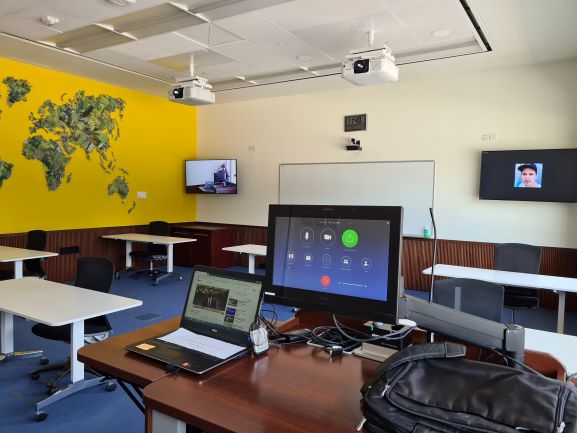Georgetown’s Innovative EdTech Tools Ensure Learning Never Stops at QF

At Georgetown University in Qatar (GU-Q), ongoing strategic capacity building with educational technology and a growing suite of digital teaching tools allowed the QF partner to continue delivering its rigorous multidisciplinary curriculum in international affairs virtually, despite the disruptions of the pandemic.
From digital learning management systems that enhance educational environments, to guidance on effective teaching practice and student assessment techniques, to student learning and support, the university’s resources ensure academic success amidst a health crisis that continues to impact education sectors around the world.
According to the dean of GU-Q, Dr. Ahmad Dallal, “Our academic teaching design and support efforts are core to the mission of the university. By staying at the forefront of the latest innovations in education technologies and teaching practices, we were better prepared to navigate the disruptions of the crisis when it happened. And we have continued to expand our infrastructure and support services to ensure that we are ready to support the academic mission of the university for the duration of the public health emergency and beyond.”
Headed by Dr. Anne Nebel, Associate Dean for Teaching, Learning and Assessment, GU-Q’s Office of Academic Services led the quick transition to an online teaching and learning environment, and has continued to develop and enhance programming to sustain the school’s high academic standards.
“GU-Q has dedicated instructional design support to help faculty transition and develop their courses in the virtual environment, including one-to-one consultations, group webinars, and custom-designed training videos and guidebooks.”
In addition, she said, “Our faculty have full access to the Center for New Designs in Learning and Scholarship at Georgetown’s Washington, DC, campus, with a wealth of materials, resources and training to support online and hybrid teaching and learning.” The university also employs a fully integrated online disabilities services management system to accommodate students with additional accessibility needs.
According to Dr. Nebel, the starting point for any course design begins by identifying the learning objectives of the class. “In traditional classroom settings, class meetings tend to be more fluid and can shift with the discussion or as needs arise. In an online class, more detailed and advanced planning is required to map the development of the course so that students at a distance can better navigate the course content through various methods of engagement and activities designed by the faculty member to promote active learning.”
The ongoing pandemic means that institutions of learning will continue to rely on virtual elements, and at GU-Q, plans have already been developed for maximum flexibility and support for both faculty and students for the upcoming semester.
Dr. Nebel also leads the university’s efforts to maintain strategic collaborations with several partner entities in Qatar Foundation and beyond in an effort to enhance and enrich the educational landscape in Qatar through offering support and contributing thinking toward flexible, innovative teaching and learning solutions.